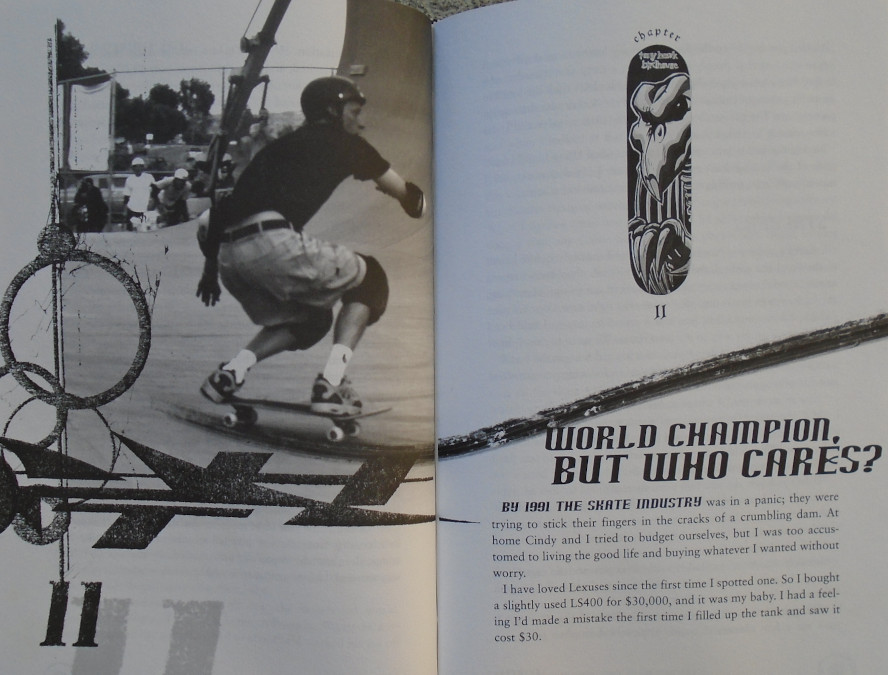Tony Hawk was a skateboarder from an early age. He grew up in the San Diego area with parents that encouraged him to follow his dreams. The book follows his life from when he got his first skateboarding ramp until the turn of the Millennium, when he was the nearest thing to a superstar in the business. Reading it feels like a cross between talking to him from the next seat over on a long journey and watching a movie about his life. Judging by the read, the guy is a great entertainer.
One of the things that made his path towards skateboarding work was that he grew up near a mighty fine skateboarding park. As a gawky preteen he went there and started learning tricks. After a while he was winning competitions and totally hooked on the adrenaline of that. Before long he was competing regionally and came to the attention of a skateboarding company. They added him to their summer tour between sophomore and junior year of high school. It was a great success. By the time he was out high school he was already an established pro on the circuit.
Another thing that helped was the enormous support he got from his parents. Not only did they drive him to many, many skateboarding competitions, but they also got involved with skateboarding in substantial ways. After skateboarding competitions he'd bring home most of the competitors and their hangers on, and his mom would feed everybody and let them have the run of the place. After his father found out how disorganized the skateboarding community was he founded the National Skateboarding Association (NSA). The guy also built many really good skateboarding ramps, including the ones at the houses that Tony bought with money from his skateboarding career.
There are many, many anecdotes from skateboarding demo tours. Enough of them that I feel some slight understanding of the industry. Skateboarding tours are all about opening the eyes of the randomly curious about what is possible on a skateboard. The tour shows up near a skateboarding shop and the riders demo their skills and talk to the local kids about what is possible on a skateboard and give them a few tips on how to get better. When the tour leaves town more people want to do that kind of stuff, and they have to buy the pads, helmet, and boards that make it possible. It was how the manufacturers supported their local affiliates everywhere they could.
The book is almost completely devoid of politics. There is one paragraph where he describes meeting Donald Trump in a "rolling my eyes at the rich guy" kind of way. There is a snapshot of him meeting Monica Lewinsky with the caption "Close, but no cigar." In a 284 page story this is nothing. He talks about how poor the tour of 1991 was, but not a word about why. It's just a mysterious "market forces" kind of thing. I had to compare the story with what I knew and started wondering "Could it be the fact we were in an oil war had something to do with it?" Instead of an answer he sings the blues about how expensive it was to eat at Taco Bell then. They just didn't have much.

What the story lacks in politics it more than makes up for in humor. Apparently the skateboarding world was amateur enough that contestants occasionally got into situations where nature called and they were forced to "lay cable" behind a nearby tree. And then there were stories like this one, which felt like fiction, but made me laugh.
There are enough pictures that the reader really feels like you're watching him go through his life. This means that many key points you're feeling it from his point of view reading the narrative. Then there is a picture that shows what it looked like from the outside. That is unusual, but it works well in this case.
One thing that surprised me about this book was how many people had heard of the author. Every time I said I was "Reading Tony Hawk's book." I'd get a "That's interesting!" reaction. My neighbor with young kids thinks of Tony Hawk as "The greatest skateboarder of all time." His fame is real. The book was written at the end of his professional skateboarding competitive career, but he's still in the industry. I know because I googled and found out. Now he's a commentator on skateboarding for ESPN and a key force at some skateboarding company. The Skateboarding video games he was helping debug near the end of the book have become hugely successful and gone through many editions. Near the end is a rant about how he wishes fans would behave.

After everything else there are a few appendixes. One lists how he did in skateboarding competitions (Usually in the money, but not always.) from 1980 to 1999. Another describes skateboarding tricks, sorted by year he invented them.
Author: Tony Hawk with Sean Mortimer Title: HAWK OCCUPATION: SKATEBOARDER ISBN: 0-06-019860-5 Page visitor count: 1394



